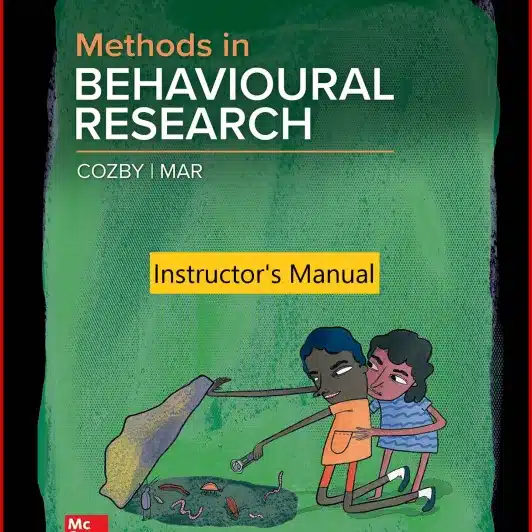Original price was: $79.99.$24.99Current price is: $24.99.
Instructor’s Manual for Methods In Behavioural Research 4th Edition By Paul C. Cozby © 2024
Product ID: 0691200
For Contact: bookzon.shop@gmail.com
Description
Instructor’s Manual for Methods in Behavioural Research, 4th Edition
By Paul C. Cozby © 2024
Overview of the Book
The 4th Canadian Edition of Methods in Behavioural Research by Paul C. Cozby is an essential resource for students learning the scientific approach to behavioral research. This edition focuses on developing students’ skills to think scientifically and critically. Scientific thinking involves understanding the complexity of the world and determining the most effective ways to solve challenging problems. This manual helps students identify the best research approaches for various problems.
Cozby’s clear and engaging writing style has made this book a trusted tool for both students and instructors. The new edition enhances clarity and inclusivity by updating chapter titles and making edits throughout the content. Additionally, this version introduces two new chapters on sampling and qualitative research methods, along with expanded content on statistical software.
The 4th Canadian Edition is available in Connect, a digital teaching platform that integrates with Learning Management Systems (LMS), making it easy to personalize, measure, and deliver content, offering a seamless experience for both instructors and students.
Table of Contents
Chapter 1: Thinking Like a Scientist
This chapter introduces the concept of scientific thinking, emphasizing the importance of critical thinking and reasoning when conducting behavioral research.
Chapter 2: Asking Questions and Finding Evidence
This chapter explores how to ask the right questions and find reliable evidence to support research hypotheses, focusing on the process of inquiry and data gathering.
Chapter 3: The Ethical Responsibilities of Scientists
An essential chapter on ethical research practices, this section guides students on how to conduct research responsibly, ensuring participant safety and data integrity.
Chapter 4: Who Should We Collect Information From?
This chapter focuses on sampling techniques, explaining how to determine appropriate sample populations for research and how sample choices affect study outcomes.
Chapter 5: Different Approaches to Research
Students are introduced to various research approaches in behavioral studies, including qualitative and quantitative methods, to understand their applications and differences.
Chapter 6: Making Measurements to Gather Information
This chapter covers how to make accurate measurements in research, ensuring the reliability and validity of data collected during experiments and observations.
Chapter 7: Qualitative Research: Preserving the Complexity of Information
A new chapter in this edition, it focuses on qualitative research methods, emphasizing the importance of preserving the richness and complexity of information during data collection and analysis.
Chapter 8: Gathering Information Through Observation
This chapter delves into observational research methods, detailing how to observe subjects without influencing their behavior and the ethical considerations involved.
Chapter 9: Survey Research: Asking People About Themselves
A practical guide to survey research, this chapter teaches how to design effective surveys and analyze responses to gather valuable data.
Chapter 10: Experimental Research: Manipulating and Controlling to Infer Causality
This chapter explains the process of experimental research, focusing on how to manipulate and control variables to infer causal relationships.
Chapter 11: Refining and Conducting Studies
This section focuses on refining research designs, addressing common issues that arise during research and how to conduct studies effectively and ethically.
Chapter 12: Quasi-experimental Research: Comparing Groups When True Experiments Are Not Possible
Introduces quasi-experimental research, explaining how to study group differences when true experimental designs are not feasible.
Chapter 13: Advanced Experimental Designs
A deeper dive into more complex experimental designs, this chapter covers advanced techniques and methodologies for tackling intricate research questions.
Chapter 14: Descriptive & Inferential Statistics: Describing Our Data and Making Broader Inferences
This chapter provides a guide to descriptive statistics and inferential statistics, explaining how to summarize data and make valid conclusions about larger populations.
Chapter 15: Generalizing Results: Interpreting Results and Their Replicability
The final chapter focuses on the interpretation of research results, exploring how to generalize findings and assess the replicability of research outcomes.
New Features in the 4th Canadian Edition
-
Expanded Content on Statistical Software: The updated edition includes expanded content on using statistical software for behavioral research, offering practical tools for data analysis.
-
New Chapters on Sampling and Qualitative Methods: The 4th Canadian Edition introduces two new chapters on sampling and qualitative research, reflecting the growing importance of these methods in modern research practices.
-
Improved Clarity and Inclusivity: Descriptive chapter titles and revisions throughout the book ensure a more accessible and inclusive approach to learning.
-
Connect Integration: The 4th Edition is now available on Connect, providing instructors with a powerful tool to deliver and personalize their teaching materials while tracking student progress.
For more Instructor’s Manual, click here.






Perfect for exams
Positive rating
Professional preparation
Highly recommended
Deep understanding support